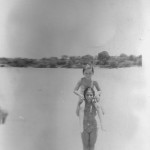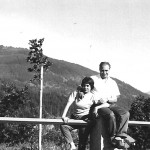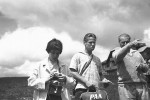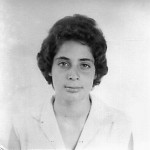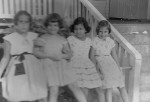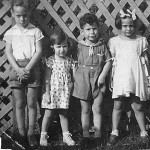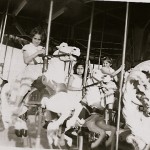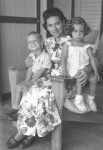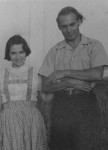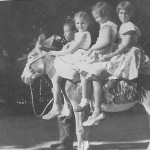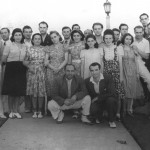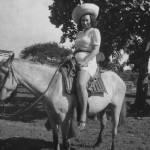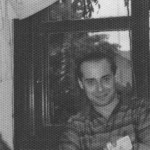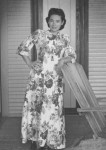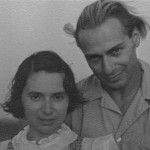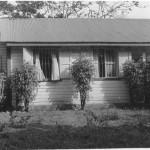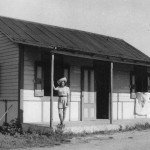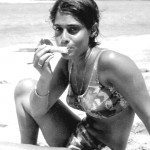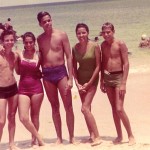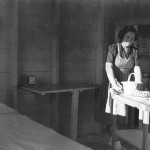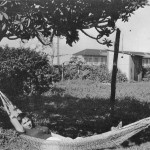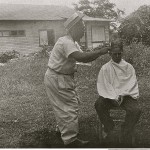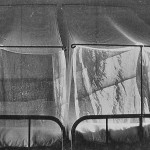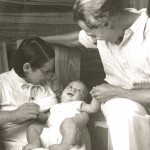| Otto Kibel: | Born in Vienna, Austria August 16, 1909 Deceased in Sosúa July 8, 2004 |
| Judith Kibel: | Born Budapest, Hungary May 20, 1913 Deceased in Sosúa, August 25, 2003 |
Children: Tschupsi, Alma
Grandchildren: Patricia
FAMILY STORY:
Otto Kibel was born in Vienna, Austria, to a hard working middle class family. His father, Robert Kibel, was a merchant of clothing fabrics. His mother, Therese Kibel nee Klein was a homemaker. They had 4 children: Walter, Otto, Alice, and Fritz. Alice died when she was a few months old. As a youngster Otto played soccer and chess, hiked, and enjoyed camping with friends. After middle school, Otto attended a printing and typesetting graphic school, and worked as an apprentice in a book printing firm. Later he worked on and off for a newspaper, where he and others printed and distributed anti-nazi pamphlets. Otto loved music, and enjoyed playing his mandolin to entertain his friends. He also frequently attended the Vienna Opera. Both of Otto’s parents, as well as many of his family members, died in various concentration camps. Otto’s brother Fritz survived, by emigrating to Argentina, via Bolivia, in 1938. His brother Walter escaped to Palestine.
Judith Bokor was born in Budapest, Hungary. Her father, Leo Bokor, was born in Czechoslovakia. Leo was a proofreader at a newspaper.He spoke several languages. Judith’s mother, Dina, was born in Vienna, Austria. Dina was a talented hat maker, whose hats were bought by ladies of high society. Judith’s passion, since an early age, was classical music, and by age 4 she started violin lessons. At age 6 she was already a gifted violinist with the promise of a great future. Leo and Dina decided to leave Hungary mid 1919, due to the increase in discrimination and agressions experienced by Jews in Hungary. Overnight Leo, Dina, and Judith fled from Hungary, on foot, to Austria. During the long journey, Judith (6 years old) almost died of pneunomia. In Vienna a doctor told her parents, that since her lungs were so badly affected, she would never be able to play the violin again. Judith was devastated, but she moved her musical passion to playing the piano. She studied at the Vienna Music Academy, graduating in 1933. Yet her dream of becoming a pianist was interrupted because of Hitler. During this time she was only allowed to give private piano lessons.
On March 22, 1936, Otto Kibel married Judith Bokor in Vienna. Two years later (like so many other Jews), Otto and Judith decided to leave Vienna, due to Austria’s annexation to Germany. They applied for visas to Switzerland, and were lucky to obtain them. On July 4th, 1938, Judith, Otto, and Otto’s brother Fritz, arrived in Zurich, Switzerland. The Vienna Kulturgemeinde (Jewish Community Center) arranged for them to move into a Refugee Camp outside of Zurich.
Daily life in the camp was hard work and the food was terrible. Otto had to work as a shoemaker, and Judith as a cook, and both had to work in the fields around the camp, including on cold winter days. For relaxation they played chess, and card games, or listened to radio music. On selected weekends they had relative freedom (within certain guidelines). On those weekends they met with Teddy, a joung man they befriended, in Zurich. Teddy took them hiking and swimming, and his parents treated them to good meals; this helped ease their pain of having left their families and friends behind in Vienna.
Otto, Judith, and other campmates, left Zurich in October 1940 with the help of the American JOINT. They took a train to Lisbon, Portugal, where they waited six weeks for a ship. In November, they boarded the “Guine”, a 15-year old steamship. The journey was long, and most passengers slept on the top deck, because of the bad smells on the lower decks. Many people, including Judith, got quite sick during the weeks of sailing. They finally docked on Ellis Island, New York, where they were taken off the ship for a few days (but were not allowed to leave the island). Their sailing journey continued on the ship Coamo from New York to Ciudad Trujillo, Dominican Republic, where they arrived on December 4, 1940. They arrived penniless, with a small bag each, and Otto’s mandolin. In Ciudad Trujillo they were picked up by DORSA personnel and transported to the small town of Sosua.
The first few months in Sosua were difficult for them, as they had to get used to the heat, mosquitoes, and unfamiliar food. Otto adapted to his new life quickly, yet struggled with learning Spanish. Judith, in turn, learned Spanish quickly (and fluently), but missed her European cultural life. She eventually learned to love the country, and especially the Dominican people, and became an avid merengue dancer. In Sosua, Otto and Judith first settled in one of the barracks. Each couple had only one small room, with a bed and shelves. There was a latrine in the back of the barracks, shared by all who lived there, and in the middle of the barracks was a shower. In 1943 their son, Tschupsi, was born in the “Clinica Dr. Vazquez”, in Puerto Plata. The growing family moved to “Atravesada”. In 1945, when Alma was born in the small Sosua hospital, they moved to their farm house in La Mulata. Once Tschupsi and Alma started school, the family moved back to El Batey, into two rooms of a barracks, until their final home, located in the Pedro Clisante street, was ready to be moved into. The new house had two rooms, a small bathroom, a good size kitchen, and a porch. The kitchen had a coal stove made of stone. The house had (only cold) running water and, eventually, electricity. Meals were eaten on the porch, and at dinner time a kerosene lamp was used for lighting, until electricity was installed. Everyone slept with moskito nets.
In the early days the “colonos” (settlers) of Sosua put on diverse events, such as theater plays, musical events, piano recitals (Judith always played the piano), lectures, and films. In their leisure time they went to the small movie house located in one of the barracks. They learned Spanish and how to work on the land. Saturday and Sunday mornings were beach days for most of the settlers and their children. Most everyone, children and adults, spent Sunday afternoons at the Cafe Stockmann, later Cafe Oasis, or at the Hotel Garden City, where Otto, who was an avid chess player, won several championships. He and others also liked to bowl in the alley behind the Oasis. Most of the children went to matinee movies. Otto first worked on a collective farm, then for 10 years in the Colmado (the only store in town), and the following 30 years, as the only cashier in the only bank in town, the Cooperativa Sosua. Judith was a teacher in the Escuela Cristobal Colon, and put together most school plays and musical events, such as the children’s choir. She also gave private piano lessons. Later she worked as a secretary in the office of the Cooperativa Sosua. Otto and Judith divorced in the 1970s, and later Otto married a Dominican lady, Bertilia. Otto and Judith never left Sosua. They died there, and are buried in the small Jewish Cemetery.
PHOTO GALLERY
- Alma, Shirley Tauber, Pupi Schwarz, Miriam Arm, Scheindel Krossberg. (In background portrait of Trujillo)
- Alma carrying Ruthie Cohnen
- Alma, Pupi Schwarz, Mary Wohlmuth, Ruthie Cohnen
- Alma, Otto
- Alma, Tschupsi, Otto
- Alma
- Alma, Pupi Schwarz, Mary Wohlmuth, Ruthie Cohnen
- Tchupsi, Ruth Cohnen, Ed Kohn, Alma
- Alma, Mary Wohlmuth, Ruth Cohnen
- Tchupsi, Judith, Alma
- Judith, Otto
- Ship that transported the Swiss Group to Sosua
- Ruthie Cohnen, Pupi Schwarz, Alma
- The Kibels with the Swiss Group
- Judith on horse Helga
- Kibels with the Swiss Group
- Judith, Otto
- Otto
- Judith
- Judith, Otto
- The Kibel house in the Pedro Clisante Street
- Judith in front of the Kitchen and later pharmacy
- Alma Kibel
- Renchi Buck, Alma Kibel, Cecil Hess, unknown, Gilad Neuman
- Judith Kibel doing laundry
- Judith Kibel resying behind the common kitchen
- Burgos cutting Tchupsi’s hair
- The Kibel’s Bedroom inside the Barrack
- Judith, Tchupsi and Otto Kibel
© Copyright Protected


